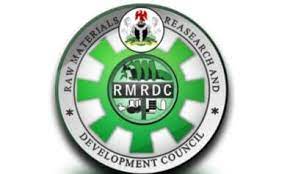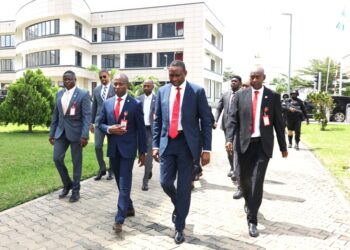The Raw Materials Research and Development Council (RMRDC), established a Global Technologies Innovations Limited (GTIL) laboratory with the aim of maintaining the standards of products for local use and for export; BINTA SHAMA reports.
Introduction
As the saying goes: Quality is never an accident but the result of intelligent effort. Quality means also doing it right when no one is looking. And these aphorisms constitute the motivation of the Director-General/Chief Executive Officer of the Raw Materials Research and Development Council (RMRDC) Professor Hussaini Doko Ibrahim, in establishing a once-and-for-all standard laboratory to confirm, authenticate and upgrade standards of raw materials for utilization by local manufacturers as local contents inputs in products formulation in the country.
The facility known as RMRDC GTIL Laboratory has the role to carry out physio-chemical analysis and certification of solid minerals and agricultural raw materials.
The Raw Materials Research and Development Council (RMRDC) Global Technologies Innovations Limited (GTIL) Laboratory facility was established with one purpose in mind, taking industrial raw materials standards from local to global. Now residing within the precincts of the much-hailed RMRDC Innovation Complex, Obasanjo Space Center, Lugbe, Abuja, the center has since become a sine qua non for a rising number of successful industry-based research and development outcomes that have competitive edge in terms of their industrial applications.
Perhaps, also standing on the conviction that a well-established laboratory facility for standardisation of industrial raw materials would lead to globalization in the sourcing, development and utilization of the nation’s abundant natural resources, Professor Ibrahim swiftly cleared all bottle necks for the establishment of the lab that is today a huge potential and impetus for the attainment of industrial competitiveness in raw materials sourcing and products formulation. The lab is today run and operated by a commercial arm of the Council known as the Global Technologies Innovation Limited which has been licensed to take its prospective public participation and offtake.
The Council’s efforts in the past, to create a system for the standardization of raw materials specification in conformity with acceptable global standards requirements is as notable as it is commendable. Irked by the incessant rejection of exported raw materials and products by the international community’s due to their substandard nature, the Council and its management led by Professor Ibrahim, have been quite busy tinkering with strategies to shore up the standard of Nigerian export commodities to meet international Standard requirements to relaunch the nation’s economic profile among the league of nations, engaging in efforts to reform Nigerian’s raw materials and products desirability and competitiveness on a global scale.
Given the fact that standards are a critical element of the trade landscape, the establishment of the GTIL Lab can be viewed as a new agenda setting effort by RMRDC to attain global standards for all industrial raw materials and local formulated goods and products and as a parameter to ensure that products produced in Nigeria are fit for consumption, that they meet specific technical standards, and that they can be used as inputs for specific commercial processes such as manufacturing.
Contributing to policy implementation
The establishment of the GTIL Laboratory by the Council under the present disposition, therefore signposts a significant leap in the right direction by Prof Ibrahim led management; at least satisfying the quest to fill in the missing gap in the drive for competitiveness in the manufacturing sector that is globally, today a cradle of innovation and technological change. For any form of advancement to take place in this direction, there has to be Research and Development (R&D) that can be commercialised.
The RMRDC as an institution of government, is saddled with the responsibility of contributing to policy implementation of home grown viable economic variables that cut across proliferation of SMEs for job and wealth creation utilizing critical agricultural and minerals raw materials, fostering collaborations and linkages for a knowledge driven and innovative approach for raw materials development and utilization, outright development of local raw materials for Nigeria’s economic growth and development. It is therefore not surprising to add the latest entry in the series of emerging accomplishments of the Council – the GTiL Laboratory – to efforts in the right direction which will go a long way in shoring up the nation’s level of competitiveness that is required in the R7d sector of the economy.
Past and recent studies have shown that investment in standard infrastructure within the research and development ecosystem can lead to economic growth by allowing for the proliferation of new innovations and inventions that support industrial development and growth. Applied research can also lead to improving existing products and processes thereby spurring innovation, invention, and progress. It is therefore safe to conjecture that the establishment of the laboratory, apart from seeking to change the status quo in a responsible manner, shows a commendable commitment by the Council under Professor Ibrahim, to attaining vertical, horizontal, and optical growth in the nation’s access to independent, credible inspection, testing, certification and accreditation services in the R&D sector of the economy.
It is strongly believed that economic growth and related improvements in standards of living are tied to innovation and technological development. Investments in standard infrastructure and technological advancements have been known to have transformed economies around the world. Innovations and technological advancements cannot be realized without research. In the same vein, research and development cannot occur in a vacuum without functional infrastructure and other relevant facilities that qualify the RMRDC GTIL-Laboratory as a major accomplishment worthy of emulation by relevant institutions, private or public, as a way forward in the quest for a dynamic and competitive economy.
Haven established the laboratory facility with the foresight of a sage, the GTIL-Laboratory today stands as a sentinel crucial to any meaningful research that can be conducted on raw materials standardization and quality that will lead to commercialization of viable research results and innovations going beyond raw materials and products development to other areas of societal progress.
While it is common place to attribute the rejection of Nigerian exports to improper packaging and mishandling of products and commodities, at production and exit points, baseline studies have shown the absence of research infrastructure for products and commodities testing and products standardization, have always constituted a bane of acceptance by the international market. In Nigeria, major commentators have always pointed to the deplorable state of research infrastructure which the Council has striven to address through the establishment of GTIL-Laboratory.
Therefore, judging by the fact that a nation’s strength can be measured by scientific research capabilities and breakthroughs linked to infrastructure, we can therefore deduce that the RMRDC has chosen to address the root cause of the nation’s industrial backwardness by selecting a fundamental line of approach to deal with the issues of improving the lot of the manufacturing sector and who must equally rely on products of R&Ds, inventions and innovations to function and thrive.
Laboratory, backbone of maintenance of standards
The role of laboratory infrastructure in Nigeria’s quest to commercialize R&D deliverables cannot be overemphasized. Studies have equally shown that laboratories are the backbone of maintenance of standards. They examine and analyze materials for local use by manufacturers and for export, among many other considerations. The RMRDC GTIL-Laboratory is therefore expected to play a major role in providing key information required to guide local manufacturers operating within the confines of raw materials sourcing, development and utilization as inputs for products manufacturing and export. Since inception of activities in 1988, the RMRDC has continued to provide services to prospective manufacturers in the area of raw materials sourcing, development and utilisation which explains its purpose for establishing the facility.
It is to be recalled that the establishment of RMRDC, was in response to the clarion call by the private sector for government intervention on the over reliance on imports by Nigeria Manufacturing industry for the supply of its raw materials, processing equipment and spare parts. The Federal Government, through the then Federal Ministry of Industry (FMI) in collaboration with the Manufacturers Association of Nigeria (MAN) and other stakeholders convened a National Workshop on Raw Materials for Nigerian industries in July 1983. The outcome of the workshop led to the formulation of a policy for the establishment of RMRDC by Decree (Now Act) No.39 of December 17, 1987 to develop local raw materials and co-ordinate research efforts especially in relation to raw materials acquisition, exploitation, conservation and development.
The Council commenced operations on February 10, 1988 and immediately embarked on the Techno Economic Survey to determine the status of Nigeria’s natural resources vis-à-vis occurrence, production, development and utilization. This exercise revealed the enormous economic potentials available in the country which hitherto had not been utilized. In other words, Nigeria was expending foreign exchange to import raw materials and products which could be sourced locally.
In essence, the Council was established to primarily: Serve the interest of the industry and the private sector by facilitating the sourcing, development and utilization of local raw materials; Provide information which would enable government to formulate appropriate policies for local raw materials development and utilization taking cognizance of the implications of depletion, conservation or stockpiling; Reduce the dependence and expenditure on raw materials imports, conserve foreign exchange by ensuring increased productivity, capacity utilization and sustainable industrial growth and ultimately create jobs.
At this juncture, It is noteworthy that the economic crisis of the 1980’s which led to the establishment of the Council have worsened due to global competition, fall in oil prices and trade liberalization. Therefore the Council and its activities are even more relevant today than it was at inception.
Conclusively, by setting up a one of a kind GTIL-Laboratory in the Council to provide services for analysis and standardization of Nigerian raw materials for industrial utilization and export, the Council has taken a significant stride in bridging the gap between providing standard raw materials for quality manufacturing in the country, and development of competitive raw materials and products for but local consumption and export. This is a major step which should provide impetus for replication of similar efforts by the government at the center and allied institutions in both private and public spheres.
Government should promote policies that will lead to the expansion of the vision that birthed the RMRDC GTIL-Laboratory and encourage partnerships and collaboration between university and Industry. For emphasis, policie should be developed along the lines of promoting research-industry linkages and the Organised Private Sector (OPS) of the economy encouraged to collaborate with relevant institutions through the direct role of providing funding for establishment of more specialized laboratories to guide on standard manufacturing in Nigeria. Government should also initiate policies that will encourage the OPS to utilise outcomes of R&D and laboratory facilities in the country.
The material was prepared by the Director Corporate Services Department (CDS) RMRDC Mr. Chuks Ngaha.




